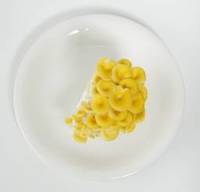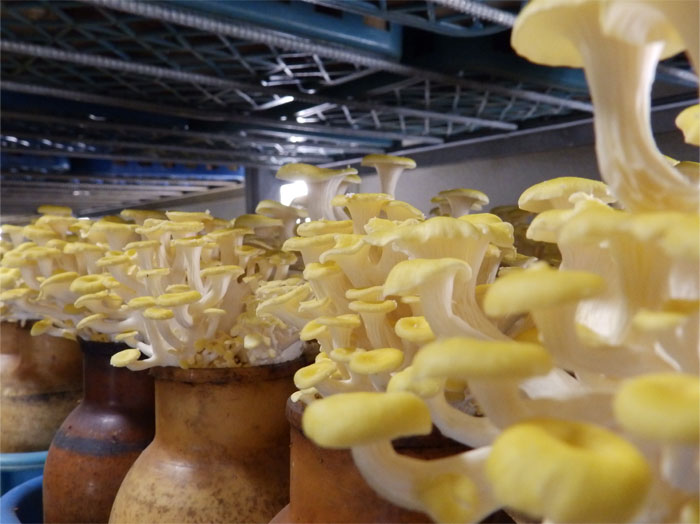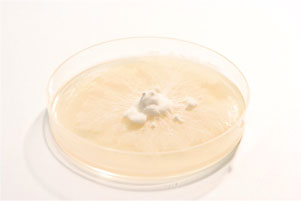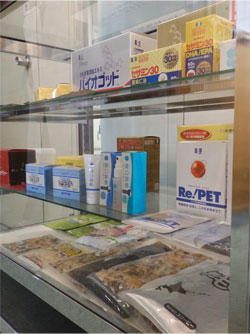Elm Mash 291

Hokkaido Tamogitake Increases Antibacterial Peptide Levels, Stimulates Intestinal Immunity.

Developed Jointly by Hokkaido Government and Industry, the Yellow Mushroom That Brings Happiness.
Tamogitake is a mushroom of the genus Pleurotus of the family Pleurotaceae which grows in the wild on fallen elm trees in Hokkaido. One might be able to find it while wandering through the forests of Hokkaido during its short summer season. It gives off a brilliant golden glow, and its color and rarity has led it to be prized and called "the phantom mushroom." Richly aromatic, with exquisite consistency, it has been a beloved edible mushroom among the people of Hokkaido for a very long time.
Nanporo-based food product manufacturers successfully developed artificial cultivation technology for tamogitake in 1985. Developed through cooperation between Hokkaido's governmental and commercial organizations, this first registered breed of tamogitake, Elm Mash 291, can be seen more and more frequently in supermarkets and restaurants outside of Hokkaido itself. It has received attention for its high nutritional content and ease of use in cooking. It is even used in the school lunches of 35 prefectures in Japan, from Hokkaido to Kyushu. Fans from all over call it Sorachi Tamogi.

Elm Mash 291 is cultivated using an advanced system which takes full advantage of biotechnology. The sawdust of Hokkaido karamatsu trees is used as a base culture medium, which is loaded into a culture bottle and sterilized. Then, in a strictly-controlled sterile environment, an automatically controlled robot is used to inoculate the fungal seed. Before long, yellow, umbrella-shaped stumps start to form and then overflow from the culture bottle. The mushroom takes about 20 days to fully cultivate, during which it is kept in carefully regulated air-conditioning for optimal growth.
Protects Body from Incurable Diseases like Ulcerative Colitis, Crohn's Disease, and Cancer.
Elm Mash has received attention for having positive effects on health and beauty. It is rich in the healthy compounds β (1-3) glucan, which revitalizes the immune system, and the highly antioxidative water-soluble amino acid ergothioneine. Additionally, it contains a great balance of vitamins B1 and B2, natural minerals, and over 20 varieties of critical amino acids that the human body cannot synthesize.

Elm Mash 291 has been studied jointly by a network of industrial and academic groups including Sapporo Medical University and Hokkaido University. Health benefits reported include antitumor effects, antioxidative effects, hypotensive effects, effects on inhibiting rises in blood sugar, skin moisturization from ceramides, and anti-allergy effects.
For just an example of these effects, Professor Kazunori Kato of Sapporo Medical University presented his report "The Suppressing Effect On Suppressor T Cells and New Antitumor Effects of Tamogi Mushroom Extract" in April, 2005 at the 96th Annual Meeting of the American Association for Cancer Research. A concentrated hot water extract of Elm Mash 291 was shown to suppress the growth of cancer cells and prolong the lives of lab mice.
The activation of NK cells is generally considered to be the basis of our immune systems. Elm Mash 291 has been found to have an anti-tumor effect by suppressing T cells, which themselves work to lower our immunities. Foreign research has also confirmed Elm Mash 291's beneficial effects.
In 2012, Professor Tokiyoshi Ayabe's research group at the Hokkaido University Graduate Studies Department presented their new research findings. Professor Ayabe is an authority in immunology, and he studies the activities of antibacterial peptides in mucosa immunity. He has previously discovered how Paneth cells in the small intestine secrete the alpha defensin antibacterial peptides.
Alpha defensins have the ability to distinguish external threats so that they only attack germs. It also helps improve the intestinal environment. Its relationship with refractory tumor illnesses is also currently being studied. There are indications that abnormalities in alpha defensin production and function may have an effect on ulcerative colitis and Crohn's disease.
Professor Ayabe's research shows that a concentrated extract of Elm Mash 291 can increase alpha defensin levels. Elm Mash 291 is expected to improve the intestinal environment and raise intestinal immunity.












